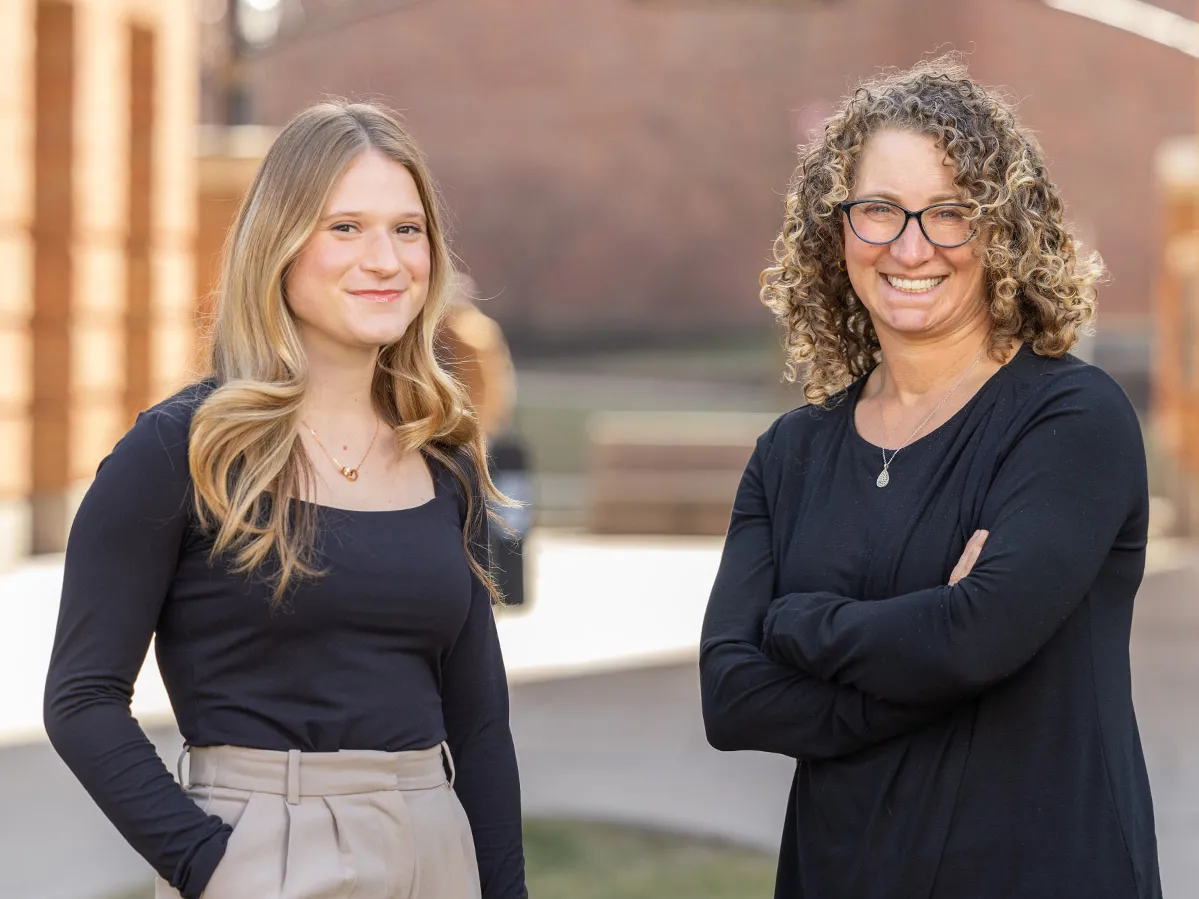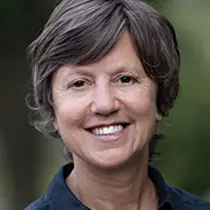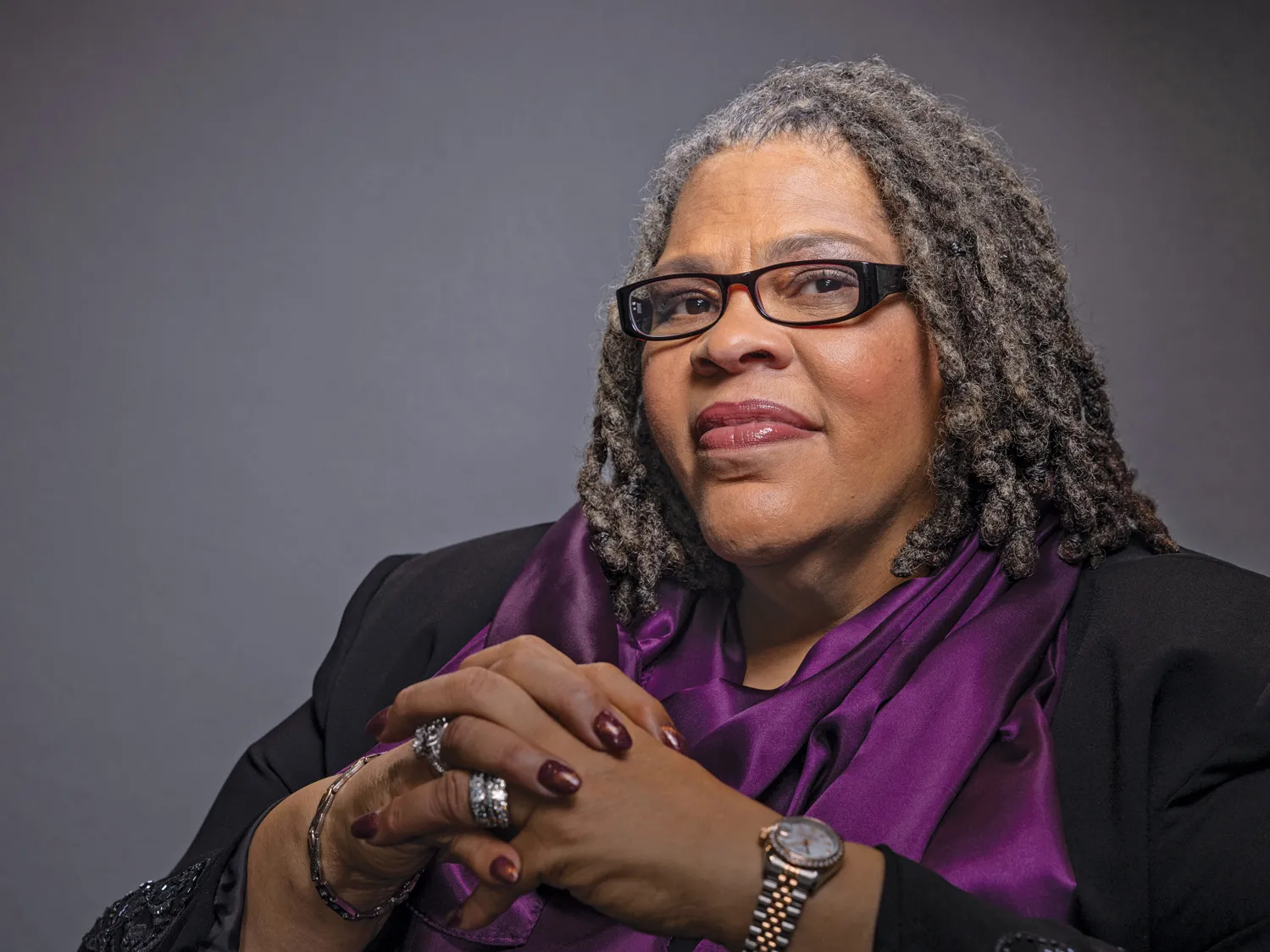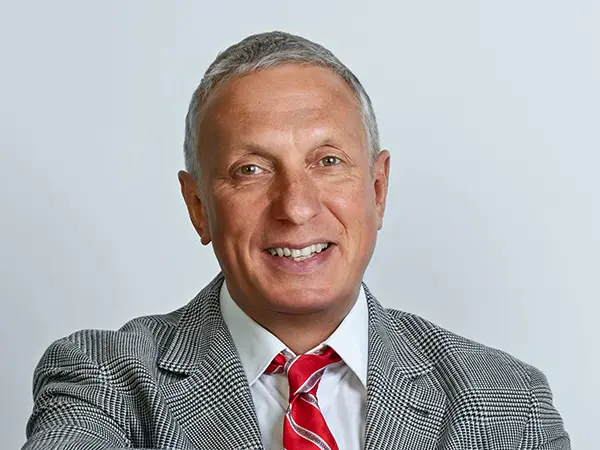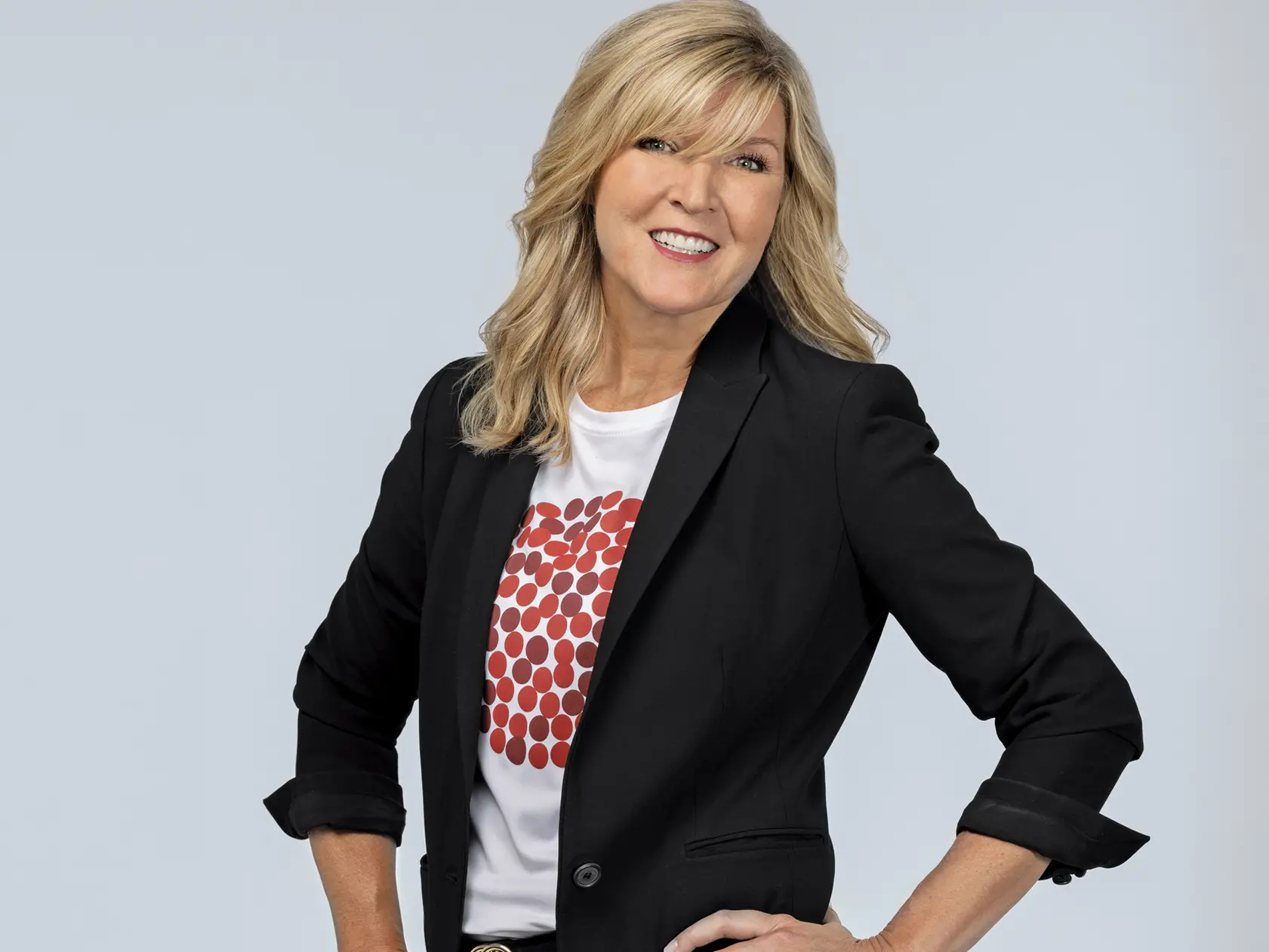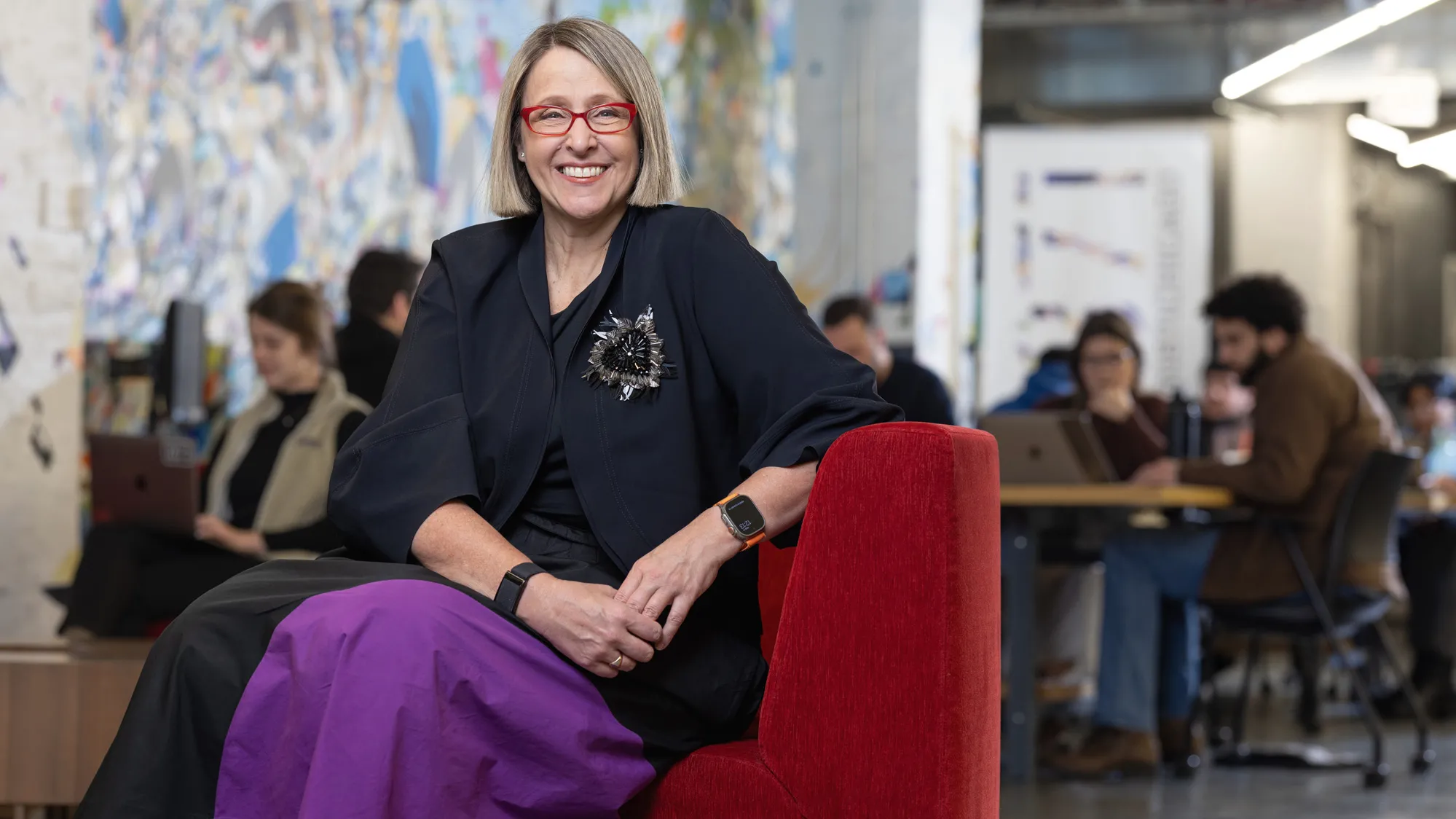
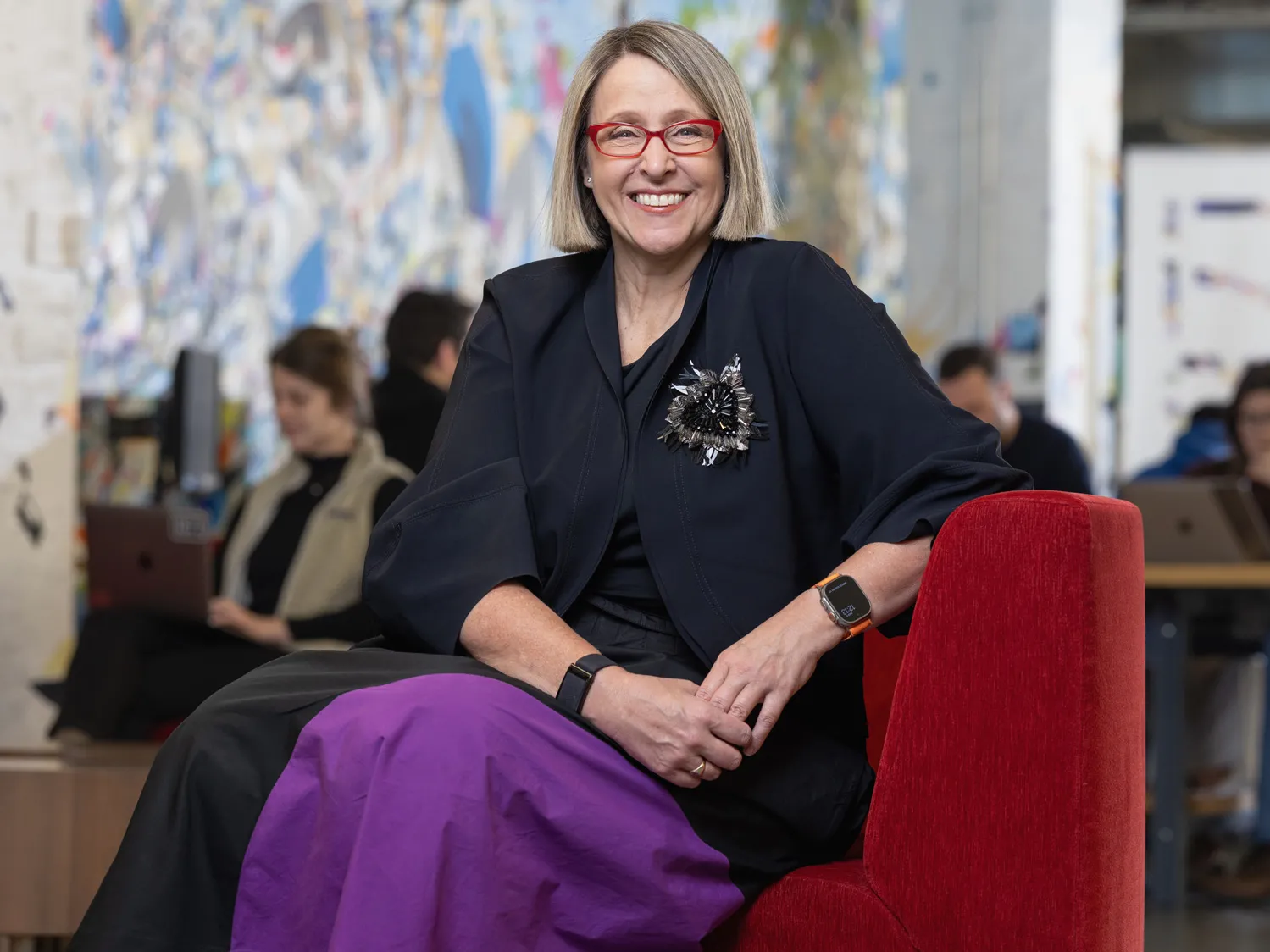
Betsy Ziegler: Impact player
If the 1993 graduate is in, she’s all in — from her days at Ohio State to her roles today as CEO of a top business incubator and single mom to 11-year-old Charlie. A champion for the greater good, she is fiercely committed to acting with intent and giving others a hand up.

Results matter, not credit
This is a story about a CEO, a member of several company boards, a community leader who begins every workday by rising from bed at 4 a.m. It’s a story about a doting single mother, a loyal friend and a huge Buckeye fan who named her dog Eddie George after the star player from her college days.
“I’ve never defined myself by my job,” says Ziegler, who begins her days during our nights so she can get enough work done and be home to greet her son, Charlie, when he returns from school. He’s 11 years old and the absolute shining center of his mom’s universe.
“He’s a happy kid, which at the end of the day is my job — to raise a happy person,” Ziegler says.
Her good friends, many of them classmates and sorority sisters she met at Ohio State more than 30 years ago, attest to her devotion to those she’s close to. They’re on calls, video chats, text chains — exchanges roar during Buckeye football games — and they visit as they’re able. Ziegler joined five on an extended weekend trip to San Diego in January.
“Betsy values a good foundational friendship, which is hard to find today,” observes Vanessa Meyer ’93, who met Ziegler when the two were Kappa Alpha Theta members. “She makes an effort to stay invested. She prioritizes relationships in her personal life and in business.”
Putting others first has been the lodestar for Ziegler throughout a career that began in Cincinnati and veered to Chicago. Her stops on the way to 1871 included three years in credit operations at GE Capital, more than a dozen years as a principal at McKinsey & Company and seven years with the Kellogg School of Management at Northwestern University.
“What links everything together,” Ziegler says, “is that for literally every day of my professional life, I’ve woken up in service of helping somebody else be successful. I’ve learned that’s ‘my thing.’ It was my thing with clients, then students and now entrepreneurs.”
Ziegler’s people-first nature fits the 1871 mission, which helps innovators, inventors and entrepreneurs connect to capital, customers and mentors.
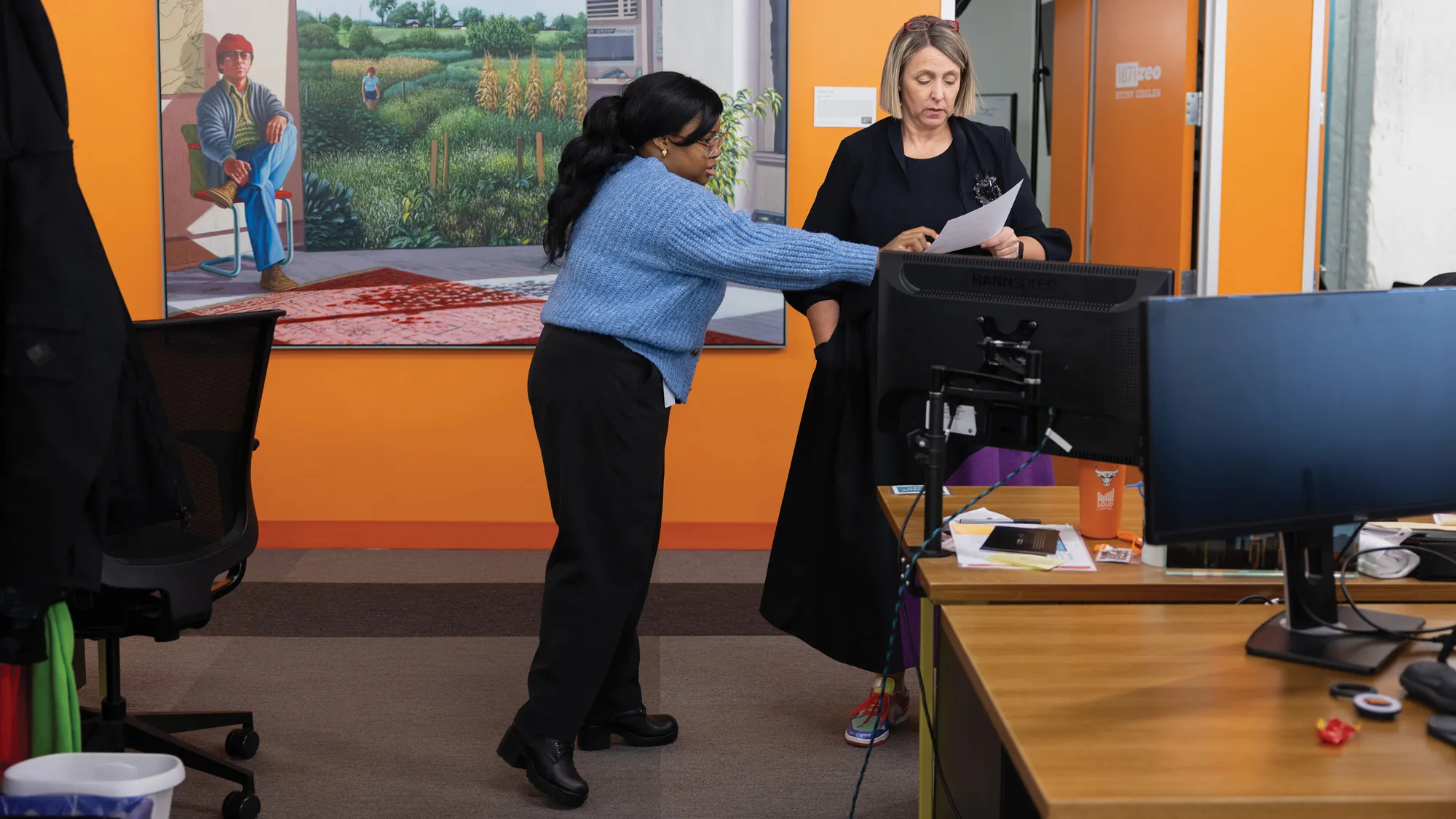
Ziegler keeps her schedule packed and moving fast with help from project manager Tomisin Asupoto. She favors half-hour meetings to maximize efficiency. “I can power through, but my brain is tired by the time I get home.”
“My call to action for all founders on day one is that I expect them to make the community better,” she says. “We talk quite a bit about what the role of entrepreneurship is in things like narrowing the wealth gap. We don’t think that there’s anything more important than helping people start their own business and be in control of creating their own wealth.”
Among the organization’s 480 early-stage founders, 23% identify as Black and 10% as Latino. Thirty percent are women. The aphorism “a rising tide lifts all boats” is a core belief.
“It’s important to us that [founders] are building where they live so that any investment that comes into their business — whether from their own revenue or external investment — might employ another person in that neighborhood or might change that individual or their family’s trajectory, which then gets reinvested in the neighborhood.”
Ziegler has kept 1871 on course throughout the business challenges posed by a global pandemic. The organization has fueled more than 1,000 active companies and more than 14,700 jobs. Among its members are 17 unicorns, privately held startups that grew to be valued at more than $1 billion each. In the 12 years since 1871’s founding, its partner companies have raised $3.7 billion in capital.
“Betsy has built a network effect among Chicago’s venture capitalists, business leaders and civic leaders,” says Keith Toney ’96, ’96 MA, an 1871 board member and executive vice president at Discover Card. “1871 is special largely because she infuses into it this notion of it being an incubator, a relational community that reinforces creators.
“She’s super personable and energetic. At a nonprofit, it takes someone who has a constant energy, like Betsy does, to raise funds, build relationships, network. 1871 works because of her ability to keep that flywheel spinning.”
Ziegler sees herself as a “dot connector.” She says she took the 1871 job because she thought it presented opportunities to broadly impact the greater good. Her high-profile role as CEO puts her in touch with people who have power and resources in Chicago, the state of Illinois and beyond.
“I’m fortunate to have a real seat at the table for economic development to connect and serve others,” she says.
Connections have led 1871 — named for how Chicago rebuilt after the devastating fire of that year — to partner with companies like Discover, Aon and Microsoft along with 17 universities. She also is plugged in to innovation and entrepreneurial initiatives at Ohio State, including as a member of the Ohio State Early Investor Network’s advisory board.
Ziegler creates and nurtures partnerships with people at all levels. She oversees a predominantly young team of 30 at 1871, which offers memberships to entrepreneurs that include rented office space, access to workshops and events, and the guidance of 350 mentors, including Ziegler.
“I really thrive when I’m in the mix of a great big group of people,” she says. “I don’t care about getting credit for being the leader. I care about getting a group of people to take action, to move in a particular direction.”
That course often is an uphill climb for entrepreneurs starting a company or trying to maintain a fledgling one. For them, Ziegler acts as a sherpa offering optimism.
“You can recover if you’re stuck,” she says. “You can always make different choices.”
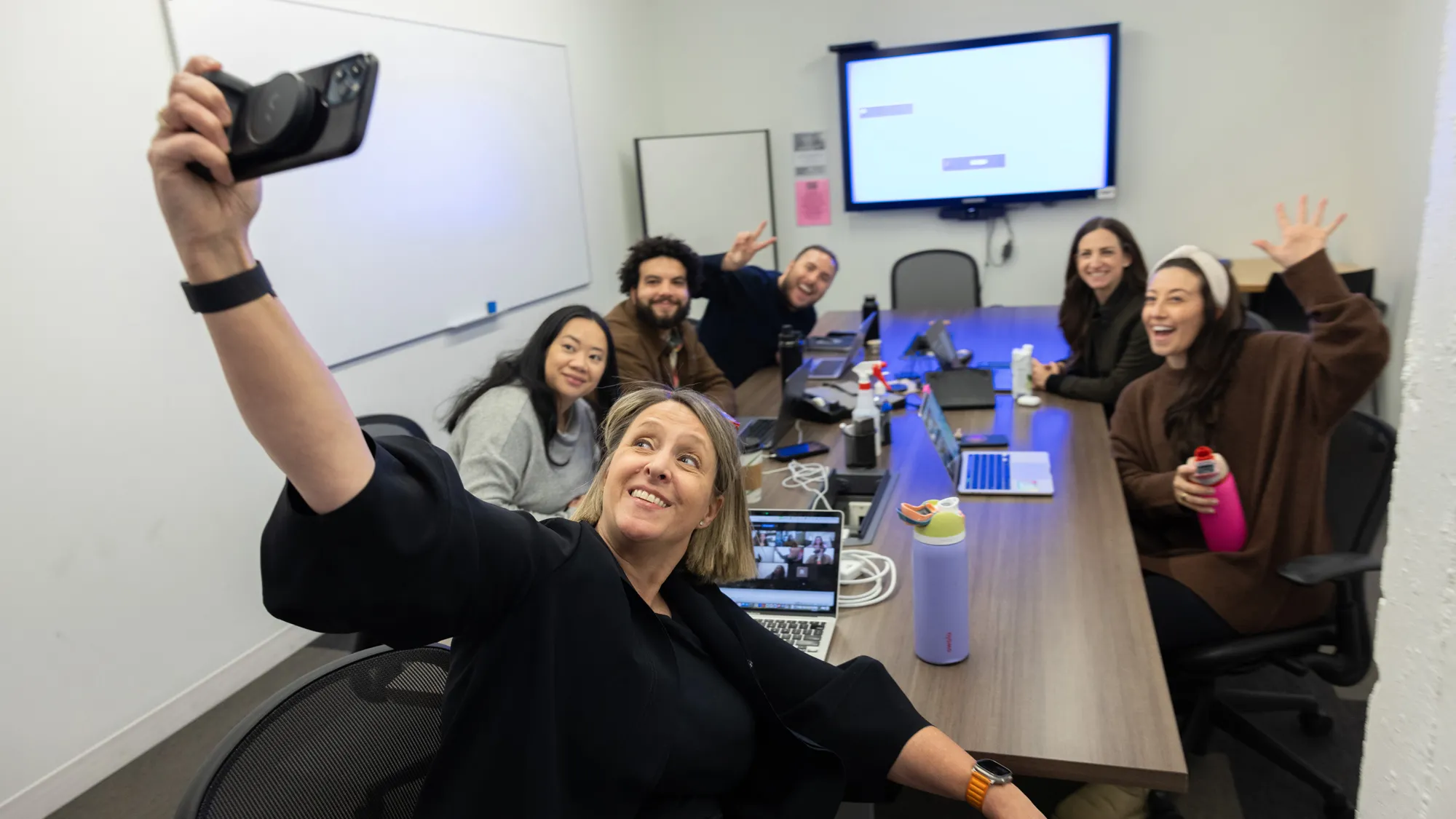
Ziegler, grabbing a selfie with members of her team, sees herself as a connector in service to others. “My joy is about interacting with people,” she says. “I get inspired by the problems they’re trying to solve, and by helping them accelerate their problem-solving.”
Always curious, always reaching
Here’s a question Ziegler asks everyone when they interview to join her team: What is the job you want after this job?
“Most of them think it’s a trick question, but it’s not,” she says.
The answer gives Ziegler a window into a candidate’s ambition and, more importantly to her, reveals if this job can help them move forward. She’s looking for people who are seeking challenges, not settling.
“I hire for curiosity,” Ziegler says. “If you’re curious, you’re wanting to learn and you’re going to improve. If you’re trying to improve, you’re helping the team improve.”
Ziegler’s own insatiable curiosity has taken her to 75 countries. Twice she has circled the globe, once by herself. “I have an adventurous spirit,” she says. “I’m a collector of experiences.”
Ziegler compiled many as an Ohio State student. To make campus feel smaller, she joined a sorority, played intramural soccer, entered the honors program. The packed calendar maximized her time — and time was something she had come to appreciate more after losing her father to cancer a month and a half before she started college.
The oldest of three, she had worried about leaving home, thinking she should stay in Cincinnati to help her mother, brother and sister. But her mom urged her to persevere and head to college as planned.
More paths opened. An education abroad program took her to Tokyo for six months, and her career options expanded with a summer job at GE Capital. Although intent on becoming a lawyer when she arrived at Ohio State, Ziegler instead left on a business path, having majored in economics and minored in Japanese. You can change.
“I’m constantly chasing the shiny thing in the corner, and Ohio State allowed me to lean into that,” she says. “It created a platform for me to do whatever I wanted with support from school leaders. That gave me confidence. It was the seed.”
Ziegler forged a successful corporate career as a partner at McKinsey & Company’s Chicago office after earning a master’s degree from Harvard Business School. But in the months following the 2008 economic crisis, she felt restless working for insurance and financial clients.
“I had become an uninteresting person to myself,” she says. “I felt stuck at age 37. I wasn’t owning my life.”
Ziegler responded by writing down 40 things she wanted to do by age 40. Her aspirations ranged from meeting entertainer Bette Midler to hiking the Arctic Circle with reindeer. The list reminded her where she finds joy.
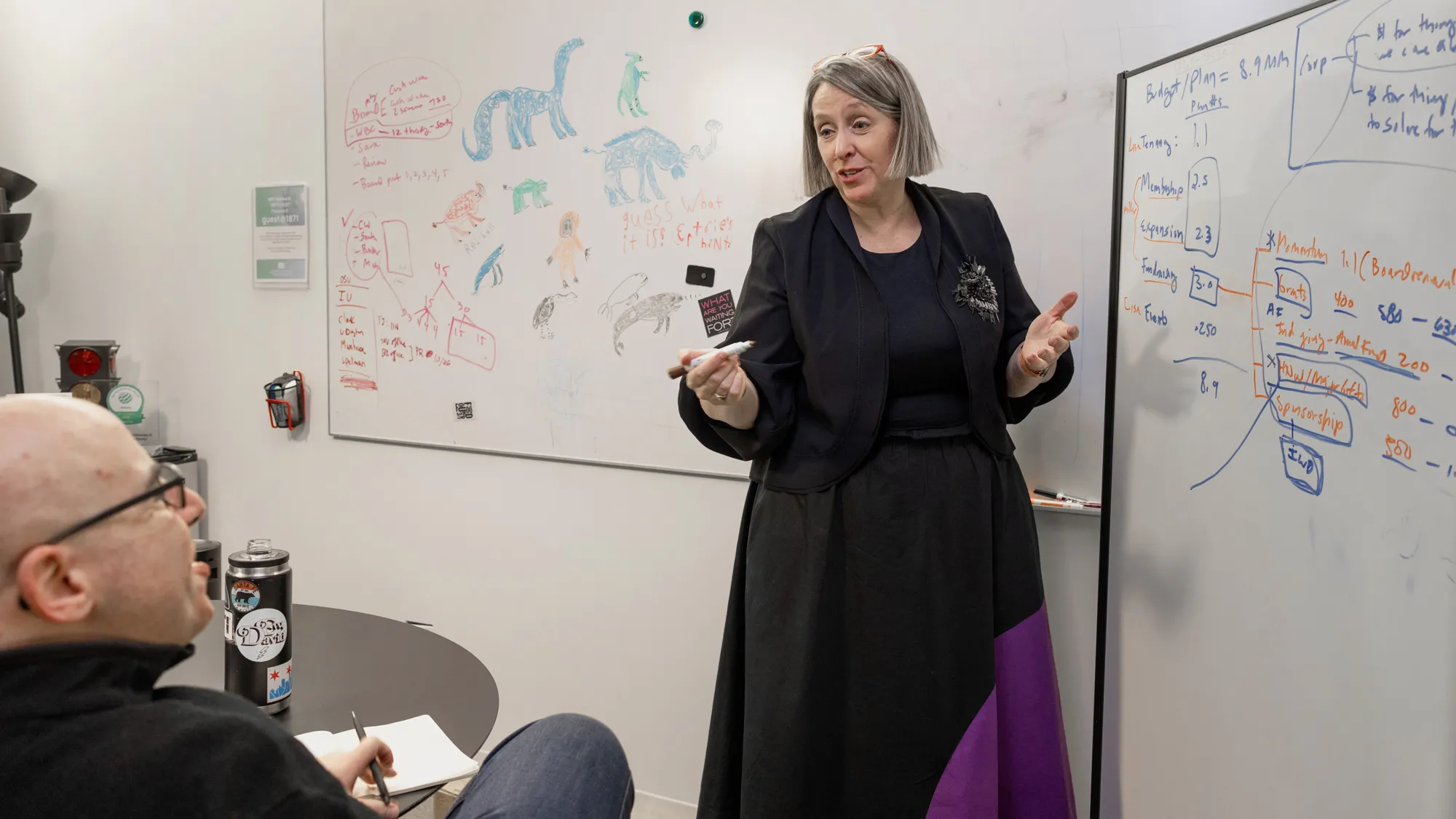
In 2011, Ziegler quit McKinsey & Company and took a trip around the world. For four months, she pondered whether she should start her own company, buy and fix a struggling one or become a leader in the social sector, possibly higher education.
“I wanted to be so excited about what I was doing that I could stand on a rooftop and scream it to people,” she says.
Upon her return, Ziegler made a bold career switch. She became associate dean of MBA programs and dean of students with Northwestern’s Kellogg School of Management, and five years later she took on that university’s newly created role of chief innovation officer. As much as she loved working with students, when 1871 recruited her to become its first female CEO, she saw a chance to impact more lives.
“The idea of taking the job made me nervous, but I knew if I turned it down, I would never get the opportunity to be that leader in the future.”
Ziegler’s leadership style leverages her contacts in higher education — she still teaches entrepreneurship and innovation at Northwestern — and business. She exudes a passion for solving problems in a team-first manner that inspires those around her.
“I’m always in awe of how Betsy navigates adversity,” says Jessie Irons, director of growth stage membership for 1871. “Nonprofit life is tough, but she’s just relentless, scrappy. One of the things that makes her special is she’ll roll up her sleeves and get into the nitty-gritty with us.
“She’s really good at asking the tough questions: How can we fix this? What can we do to make this better? And she’s great at guiding us without making the executive decision. She empowers us.”
Ziegler places importance on taking ownership, acting with intent, doing what’s necessary to benefit others. “It’s not about me,” she says.
That’s her ethos of friendship, too.
“Betsy truly cares,” says Kyle Marks, a friend since the two met as graduate students in 1997. “She’s always willing to go the extra mile for everybody.”
Going the distance side by side also is her approach to bringing up Charlie.
“We’re a duo,” she says. “It’s how we’re building our relationship together.”
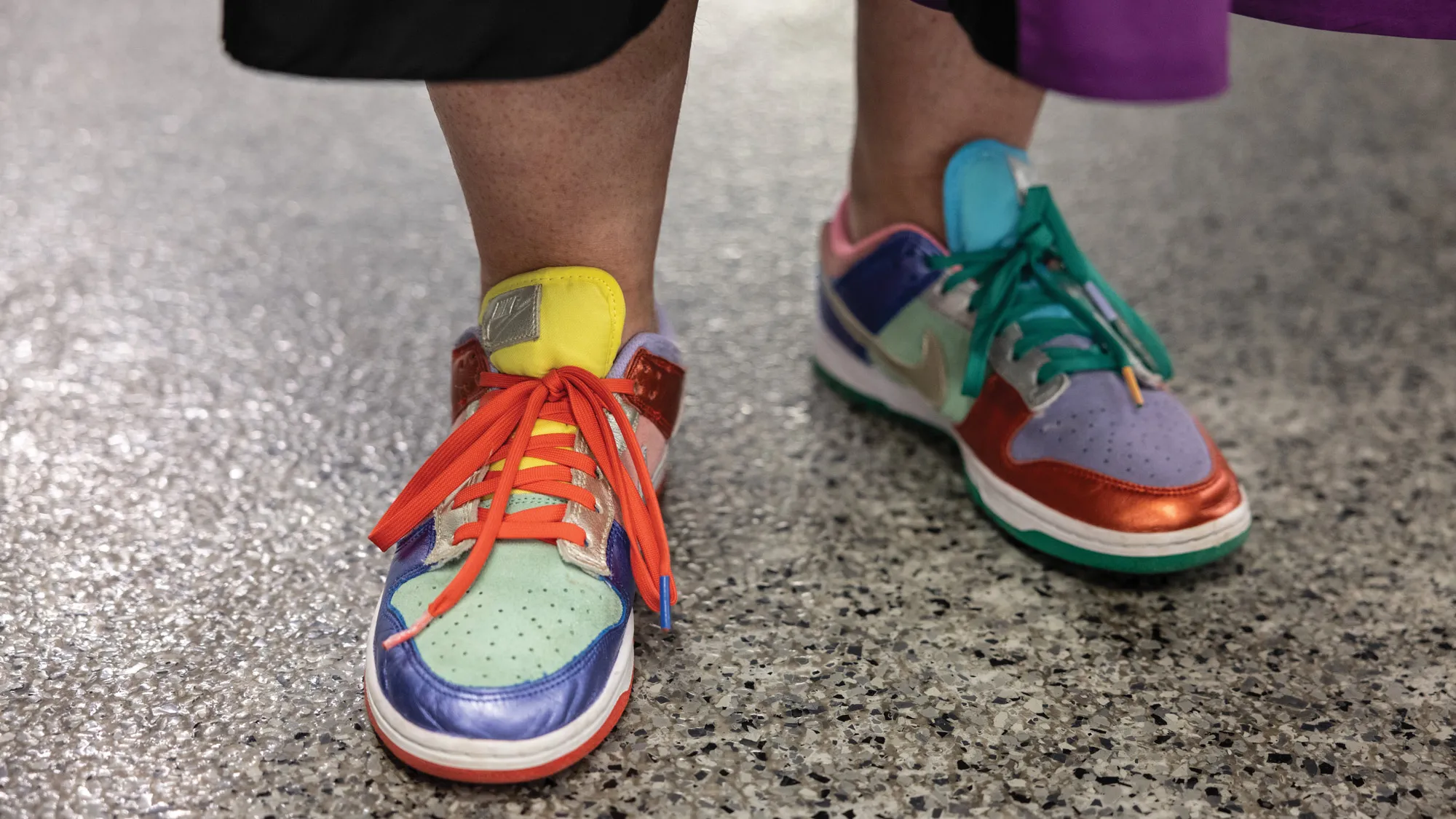
Ziegler’s choice of footwear helps her keep up with her busy schedule.
Sneakers on the ground
Dinosaurs that Charlie drew on the whiteboard in Ziegler’s 1871 office remain there years later. Some things are timeless.
Near the beasts is a small sticker that reads: “What are you waiting for?”
Those words reflect Ziegler’s resolute personality and the efficient pace of her workdays. “She moves fast,” Irons says.
Constant motion is even suggested by Ziegler’s small office table and chairs, which are on wheels, and where, on this winter day, she conducts four consecutive one-hour meetings — online, in person or both — on four different topics.
“My calendar doesn’t have moments to breathe, but I prefer it that way,” she says. “I can get as much done as possible.”
Ziegler’s attention and interest never waver during the day’s discussions with team and board members, a potential business partner and two visitors from the local Consulate General of Israel, whom she listens to for eight uninterrupted minutes at their conversation’s start.
When not in meetings, Ziegler walks 1871’s two floors. She pops into a room and greets a small business group, chats up a few tech creators using the office space and checks in with a couple members of her casually dressed leadership team.
Ziegler’s own simple business attire is complemented by shoes suited for being on the move and blending in. She’s wearing sneakers.
“You see Betsy walking around here, and you wouldn’t know she was the CEO,” says entrepreneur Dante Hamilton, an 1871 member. “You’d think she was just another startup founder like me. Her air is not the air of a CEO.”
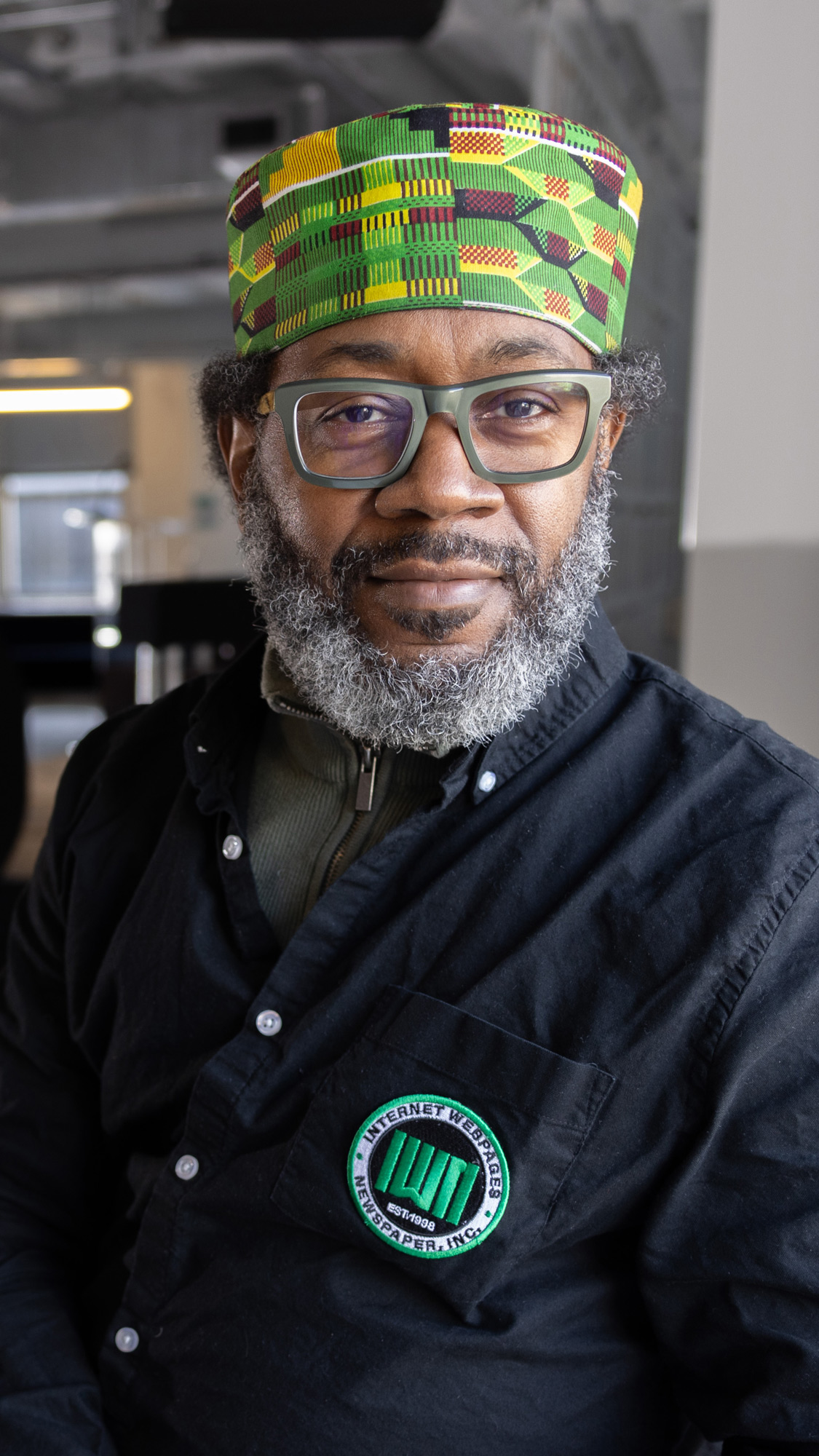
Ziegler’s style — in footwear and leadership — fits her organization’s needs.
“Most folks think of CEOs as elitists in an ivory tower,” Toney says. “You get very little time with the CEO, and that relationship is very transactional. But the nature of 1871’s business, and the nature of Betsy herself, is much more relational.
“She’s super personable, definitely much more approachable than a transactional CEO. By making herself available, she creates a sense of community, a kind of shared experience that constantly reinforces to entrepreneurs the principle that, ‘You can do this. You can make it happen.’”
Ziegler meets with every entrepreneur for a one-on-one discussion when they first become 1871 members, an opportunity Hamilton says he was shocked to have when a team member asked him to schedule time.
Hamilton credits his 45-minute meeting with Ziegler in 2023 for opening his mind about their partnership and the potential of his company, My DTC Catalog, which personalizes direct-mail catalogs for Black-owned direct-to-consumer brands.
“I was blown away by that meeting,” Hamilton says. “Betsy wanted to know who I was and what I was doing. She was asking me questions about the server, the software, the function. She was trying to figure out who in her network she could plug me into. She took the time to understand what my needs were.”
Ziegler also sets aside two hours every Friday for 30-minute meetings 1871 members can schedule with her. She calls it her favorite two hours of the week.
“I tell them it’s not my agenda, it’s your agenda,” Ziegler says. “The agenda could literally be anything, but they have to have one and it’s their job to set it.”
Tech entrepreneur Bridgette Washington has held Friday meetings with Ziegler four times in the past year to discuss her app RaveVenn, aimed at increasing voter turnout in political elections.
Washington says Ziegler’s honest encouragement about her investor pitch has been helpful.
“She’s really frank,” Washington says. “She’s not a person who is just going to pat you on your head. My first presentation wasn’t up to snuff. She said, ‘This is pretty good. You’ve done your research, got a lot of information, but haven’t hit it on the head.’
“By the time I showed her my second presentation, she was impressed. She said, ‘You’ve come a really long way since you started.’”
Ziegler says she gains inspiration and perspective from meeting with Washington, Hamilton and all of 1871’s company creators.
She draws the same from her relationship with the young artist who scribbled the colorful dinosaurs on her office whiteboard.
“Charlie’s always telling me things that I didn’t know,” Ziegler says.
“What are you waiting for?”
Life is happening now. Make time matter — together.
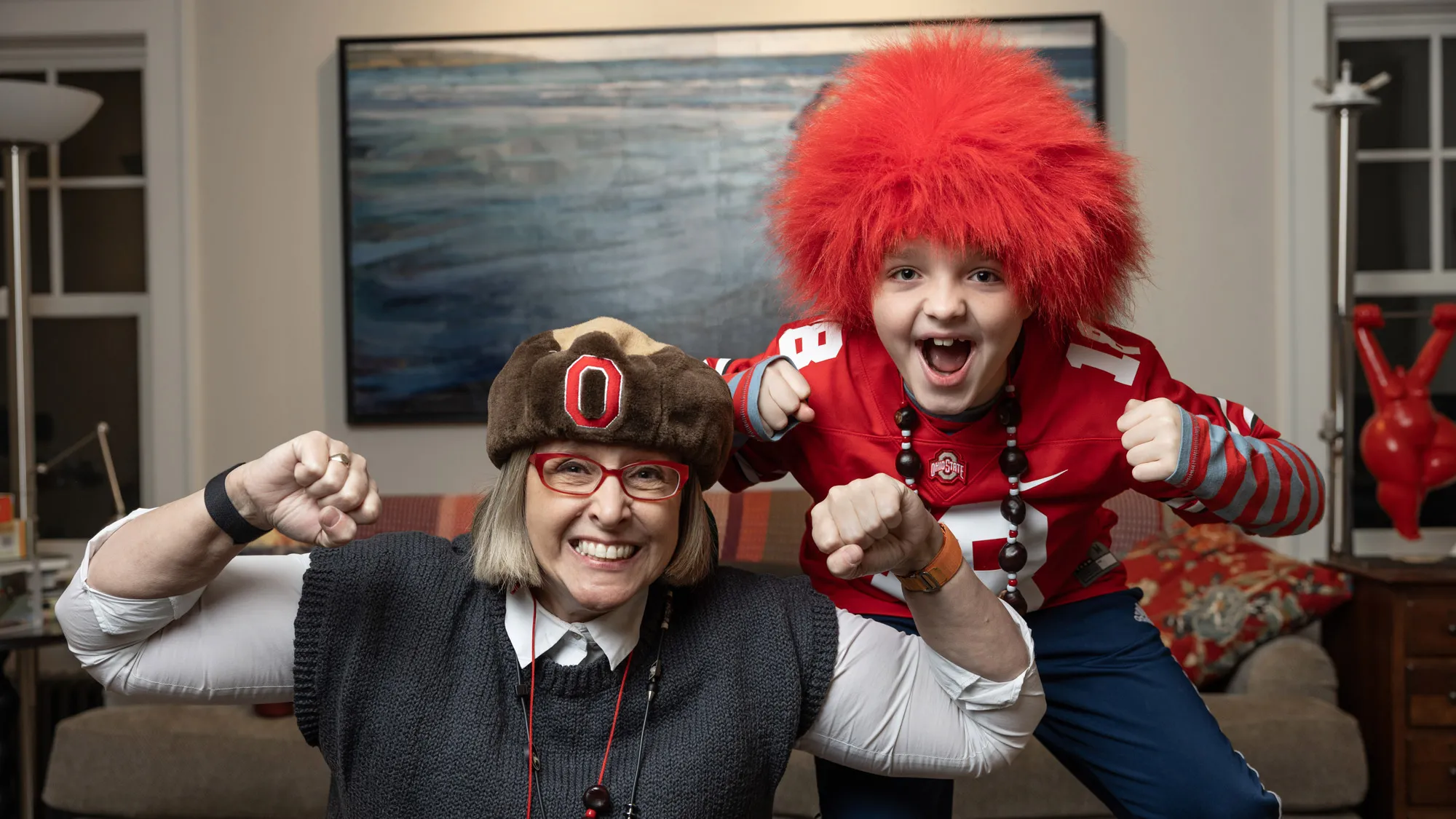
Mission 1: a happy kid
Playing cards are spread on the kitchen table in Ziegler’s home in Evanston, Illinois, about a dozen miles north of 1871’s office in downtown Chicago.
“What we got here is a standard deck of cards,” Charlie says. “Pick any one you’d like.”
Mom has seen this trick before but looks on with interest, knowing how much her son is fascinated by magic.
“He’s very, very curious about the world,” Ziegler says.
They’ve traveled the globe together, and mom supports Charlie filling hours outside school with social activities that intrigue him. He participates in Boy Scouts and choir and is the lead singer for a rock ’n’ roll band. And there’s science camp, too.
“Each day, we’d learn this big brain-breaking thing,” Charlie says of the camp. “You’d keep thinking about it, and it would keep making you have more questions.”
There is always something to ask or tell mom during their routine hourlong evening walks in the neighborhood. She’s a captive audience, far removed from CEO duties. Half of a duo.
Their partnership is evident during Ohio State football games even though Charlie isn’t much of a sports fan. “He knows it’s important to me,” Ziegler says, “so he goes all in with wearing the gear because he’s supporting mom.”
Ziegler says Ohio State is the institution she loves more than any other on the planet. She’s been known to call out “O-H” in 1871 board meetings, and while working at McKinsey & Company, she’d inflate an 8-foot-tall Brutus in the office.
“I get news about the Buckeyes from Betsy before I read it anywhere else. She’s a secret weapon keeping me informed,” says Marks, who has for years attended Ohio State home football games with Ziegler, a season-ticket holder.
Her love for the university is grounded in the relationships she formed here as an undergrad and still works to maintain. Her friends say she’s the same — approachable, easygoing, accepting — as when they met as sorority sisters.
“She’s just Betsy,” says Christine Held ’91.
In January, some of those Ohio State friends traveled to San Diego for a long weekend. Ziegler made plans to go, only to later have Charlie’s rock band schedule a show for the trip’s final day.
Ziegler didn’t cancel on her friends. Instead, she joined them but moved up her return date by a day to take a red-eye flight home so she could make it to her son’s afternoon performance.
“Betsy walks the walk,” Held says. “She lives her values.”
